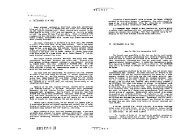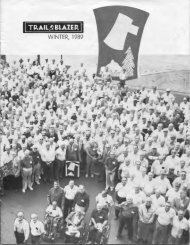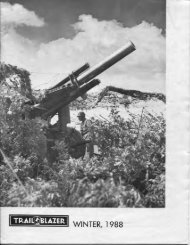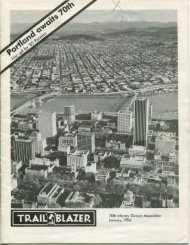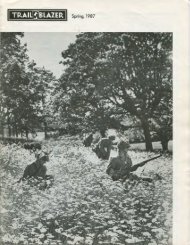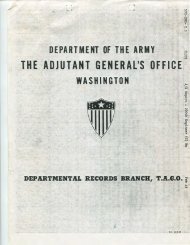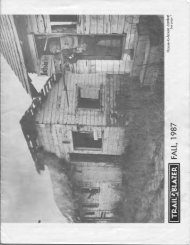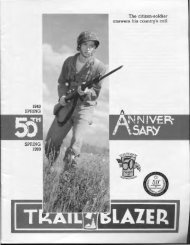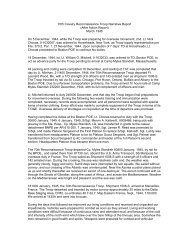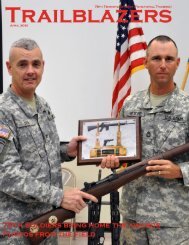Download - 70th Infantry Division Association
Download - 70th Infantry Division Association
Download - 70th Infantry Division Association
You also want an ePaper? Increase the reach of your titles
YUMPU automatically turns print PDFs into web optimized ePapers that Google loves.
April 4, 1945 - Filsen, Germany. Record of events: 2nd Platoon relieved 1st Platoon in positions on hill<br />
east of Filsen, Germany. 1st Platoon in Kamp, Germany guarding. Remainder of Company continuing to<br />
guard bridges and send out motorized patrols. On the morning of 4 April our Regimental Sector was<br />
enlarged to include Bingen and the west bank of the Mahe River which empties into the Rhein at Bingen.<br />
Also on 4 April we were ordered to furnish train guards armed with light machine guns or heavy machine<br />
guns to protect approximately ten trains per day running from Bad Kreuznach to Neunkirchen. Five<br />
squads of six men each were sent from the 1st and 3d Battalions. In addition to a light machine gun each<br />
squad carried two Browning automatic rifles and two M1's. The squads were ordered to be alert at all<br />
times and to place heavy and concentrated fire on any enemy within range. They reported to Bad<br />
Kreuznach at 0800, 5 April 1945 and remained on duty until about 20 April.<br />
The companies of the Regiment continued to guard and patrol their assigned sectors in the Regimental<br />
area during the next few days.<br />
Our men had the opportunity to see some of the most beautiful scenery in all Germany, the "sacred"<br />
Rhein country.<br />
The Rhein Valley in our Regimental Sector was very narrow. Towns were all along the banks on both<br />
sides. Vineyards lined the sides of the mountains which rose up steeply from the river's edge.<br />
A double track railroad and a two-lane highway ran down each side of the river. The railroad had been out<br />
of use for some time, but the few shell craters in the highways had been repaired and the roads were in<br />
constant use by our forces.<br />
The railroad yards at Bingen especially showed the destructive effects of our air bombings. River boats<br />
lay in the river half submerged where they had been scuttled by the fleeing Germans.<br />
Some barges and boats were found to be afloat and serviceable and were used by units of the Navy to<br />
patrol the river.<br />
A displaced persons camp was located at Ellern near the Regimental CP in Rheinbollen. Sanitary<br />
conditions at the camp were threatening the health of our troops in the vicinity, so the Regimental<br />
Commander authorized the removal of the old camp leader and replaced him with two enlisted men of the<br />
Regiment who were put in complete charge, responsible to the Regimental Commander.<br />
There were about 600 Polish and Russian nationals at the camp. Sanitary conditions were immediately<br />
improved. Better quarters, including beds, which they did not have previously, were provided. The local<br />
Germans furnished the food including milk for the children. The camp was cleaned, policed, and made<br />
habitable. An athletic field was set up near the main gate, and musical instruments were furnished.<br />
The Regimental Commander and the enlisted men concerned were commended by the Assistant <strong>Division</strong><br />
Commanding General, who inspected the camp, calling it a model installation of its kind.<br />
It was one of the few known displaced persons camp where Poles and Russians lived and worked<br />
together in complete accord. During this period of non-combat activity, the Regimental Commander<br />
decided to send the Regimental photographer back over the ground traversed by our Regiment to<br />
photograph terrain and places of interest for a proposed Regimental Photo Album and to secure pictures<br />
for the Regimental History. A liaison officer, the photographer, and a driver spent almost two weeks taking<br />
still pictures and movie film of battlefields and historical points through France and southwestern<br />
Germany.<br />
A training program was organized supplemented by an athletic program. Battalion softball leagues were<br />
organized. One of the more picturesque ball diamonds was a field on the river bank and was used as the<br />
home field for Company C.<br />
The bridges over the Rhein at Boppard and Lorch were abandoned and dismantled by Engineers, thus<br />
relieving us of their responsibility, but we were ordered to relieve the 275th Regiment on the Rhein bridge<br />
at Bingen. Company I moved in to assume responsibility. April 6, 1945 - Filsen, Germany (82.1 - 89.2).



